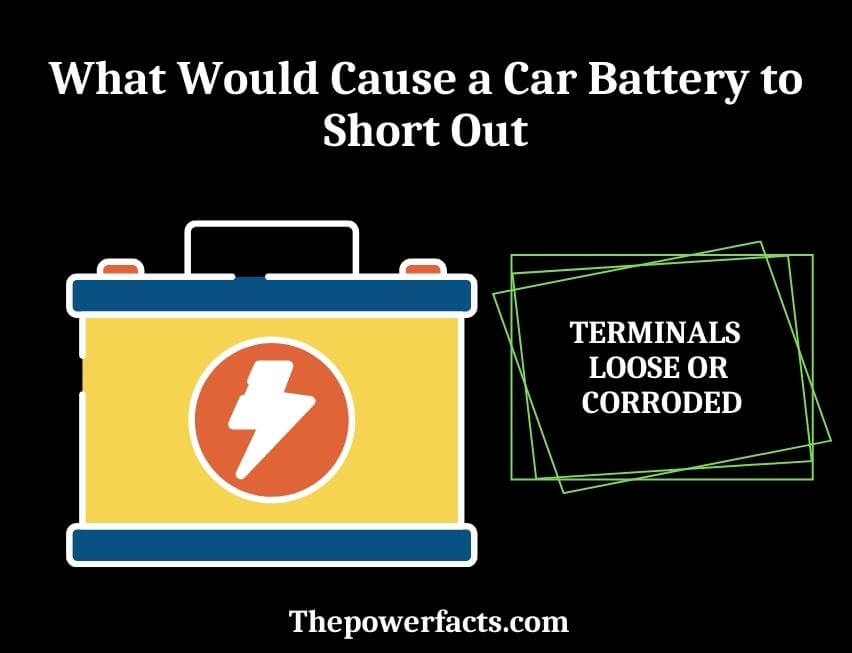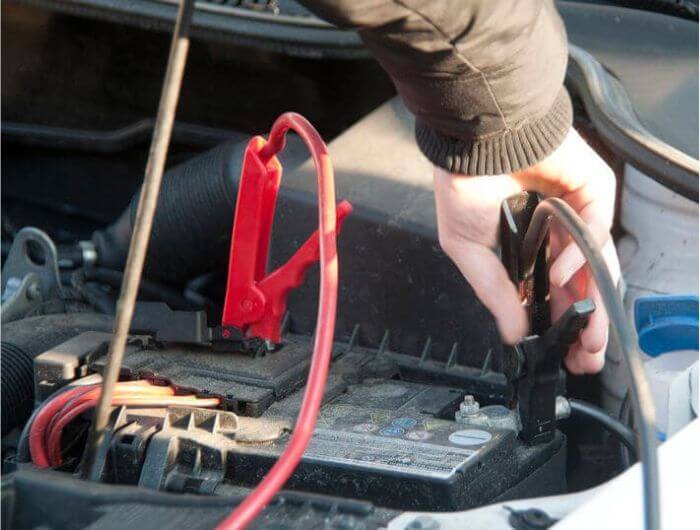What would cause a car battery to short out? The possibility is if there is a build-up of sulfate on the plates inside the battery. This can happen if the battery isn’t used for a long time, or if it’s frequently discharged below 50%. If either of these things happens, it can cause the electrical current in the battery to be interrupted, which will eventually lead to a short circuit. A bad battery causes all sorts of problem with your car.

If your car battery is shorting out, it could be due to a few different things. The most common cause of a battery short is when the terminals become corroded or a loose battery terminal. This can happen when you don’t clean your battery regularly, or if you live in an area with high humidity.
Corroded terminals will cause the electrical current from the battery to jump, or “short out.” You’ll know this has happened if you see sparks coming from the terminal, or if your car won’t start. If you think your battery may be shorting out, take it to a mechanic or auto parts store to have it tested.
Car Battery Short Circuit Symptoms
Most people don’t think about their car battery until it’s too late. But if you know the symptoms of a short circuit, you can save yourself a lot of time and money.
The most common symptom of a short circuit is that your car won’t start.
If you turn the key and nothing happens, there’s a good chance that your battery is the culprit. Other symptoms include dim lights and electrical problems.
If you suspect that your battery is shorting out, take it to a mechanic or auto parts store for testing.
They can tell you for sure if it’s the battery or something else entirely. In either case, it’s important to get the problem fixed as soon as possible to avoid any further damage to your car.
Accidentally Shorted Car Battery
If you accidentally short your car battery, there are a few things you can do to fix the problem. First, try to jump-start the battery using another car. It doesn’t matter how fast can you charge. If that doesn’t work, you can try to recharge the battery using a charger.
Finally, if all else fails, you may need to replace the battery altogether.
How to Fix a Shorted Car Battery?
If your car battery is giving you trouble, it might be due to a short. This is a common problem that can be easily fixed. Here’s how to fix a shorted car battery:
1. Start by disconnecting the negative terminal of the battery.
2. Next, locate the problem area on the battery. The most likely culprit is a damaged cell or an exposed wire.
3. Once you’ve found the problem area, gently clean it with a brush or sandpaper. Be careful not to damage any other parts of the battery while you’re doing this.
4. Once the problem area is clean, reconnect the negative terminal and give the battery a charge.
If all goes well, your car should start right up!
Can a Car Battery Short Out?
A car battery can short out if it is not properly maintained. If the battery is not cleaned and the terminals are not kept free of corrosion, the battery can develop a short circuit. This can happen if the battery is overcharged or if it is exposed to extreme temperatures.
A short circuit in the battery will cause it to discharge its electrical current all at once, which can damage the battery and other electrical components in the car. To prevent this from happening, it is important to keep your car’s battery clean and free of corrosion.
Lead Acid Battery Shorted Cell Repair
Most lead acid batteries have six cells connected in series. The positive terminal of each cell is connected to the negative terminal of the next cell, forming a “series circuit.” If one cell in the battery is shorted, it will cause all of the other cells to be shorted as well.
This can happen if the positive and negative terminals of a cell are accidentally reversed (called a “reverse current”), or if the internal parts of a cell break down and start conducting electricity between the positive and negative terminals. If you find that one cell in your lead acid battery is shorted, you can try to repair it yourself. First, disconnect the battery from any external power source.
Then, using a multimeter set to ohms mode, measure the resistance between the positive and negative terminals of each cell. One of the cells should have a much lower resistance than all of the others. This is the shorted cell.
To repair the shorted cell, first, remove its protective cover. Then, using a clean rag soaked in distilled water, wipe away any corrosion from the exposed parts of the cell. Next, using a small screwdriver or other sharp tool, carefully pierce through any cracks or breaks in the exposed parts of the cell until you reach solid metal beneath them.
Finally, reconnect your battery to an external power source and charge it fully before using it again.
Short Circuit Car Battery Explosion
Short-circuit car battery explosions are unfortunately not uncommon. This is usually caused when the positive and negative terminals of the battery come into contact with each other, causing a sudden surge of electrical current. This can often happen if the battery is not properly secured in its housing, or if the terminal connections are loose.
If you think your battery may be at risk of exploding, it’s important to take action immediately.
- First, disconnect the negative terminal of the battery to prevent any further electrical current from flowing.
- Then, remove the battery from its housing and place it in a safe location away from any flammable materials.
- Finally, call a tow truck or roadside assistance to have your vehicle towed to a nearby service station for further assessment.
Don’t take chances with your safety – if you suspect your car battery may be at risk of exploding, make sure to take proper precautions and seek professional assistance as soon as possible.
Shorted Battery Symptoms
If your battery is showing any of the following symptoms, it may be time for a replacement:
| Your car won’t start | This is by far the most common symptom of a bad or failing battery. If your battery is dead, you’ll need a jump start to get it up and running again. |
| Slow engine crank | When you turn the key, does your engine take longer than usual to fire up? If so, that’s a sign that your battery may be losing its charge. |
| Check Engine Light is on | In some cases, a dying battery can trigger your Check Engine Light. If this happens, it’s best to have your car checked out by a mechanic as soon as possible to diagnose the problem. |
Lead Acid Battery Short Circuit
When a lead acid battery is short-circuited, the current that flows through the circuit can be extremely high. This can cause damage to the battery and potentially start a fire. It is important to be aware of this hazard and take precautions to avoid it.
One way to prevent a lead acid battery short circuit is to use fuses or circuit breakers in the circuit. This will limit the amount of current that can flow through the circuit and help protect the battery from damage. Another way to prevent this type of accident is to make sure that the leads on the battery are not touching each other.
This can create a short circuit and should be avoided. If a lead acid battery does become short-circuited, it is important to take action immediately. The first step is to disconnect the power source from the battery.
This will help prevent further damage from occurring. Once the power has been disconnected, it is important to identify what caused the short circuit and make repairs as necessary.

FAQs
Why Would a Car Battery Short Out?
A car battery may short out for a variety of reasons. The most common reason is due to corrosion on the battery terminals. When this happens, it causes a buildup of electrical resistance which can cause a spark or arc that will damage the battery and potentially start a fire.
Another reason batteries may short out is due to physical damage such as from a car accident. This can cause the battery terminals to become damaged or dislodged, again causing an electrical spark that could start a fire. Finally, batteries may also short out due to manufacturing defects.
If the cells in the battery are not properly sealed, they can leak acid which will eat away at the metal and insulation, eventually causing a short. While manufacturing defects are rare, they can still happen and should be considered as a possibility if your car battery suddenly starts Shorting out.
Can You Fix a Shorted Car Battery?
If your car battery is shorted, it can be fixed by replacing the damaged cells. This can be done by a professional, or you can buy a new battery. If you have a warranty on your battery, you may be able to get it replaced for free.
What Does Short Out the Battery Mean?
A battery “short” occurs when the circuit between the anode and cathode is bypassed, allowing current to flow directly through the cell without passing through the electrolyte. This can happen if the anode or cathode material is damaged, or if a foreign object (such as a metal fragment) bridges the gap between them. A shorted battery will usually exhibit one or more of these symptoms:
What Happens If a Battery is Short-Circuited?
When a battery is short-circuited, it means that the positive and negative terminals of the battery are connected directly to each other. This can happen if you accidentally touch the two terminals together with your fingers, or if metal objects touch both terminals at the same time. If a battery is short circuited, it will start to discharge very quickly.
The current flowing through the circuit will be much higher than normal, and this can cause the battery to overheat. In severe cases, the battery may even catch fire. Short circuits are one of the main reasons why batteries need to be used carefully.
Always make sure that there is no chance of metal objects coming into contact with both terminals of the battery at the same time. If you’re not using the battery, it’s best to store it in a case or container where there is no risk of shorting out the terminals.
Conclusion
If your car battery is shorting out, it could be due to a few different things. The most common cause is a loose or corroded battery terminal. This can happen if you don’t clean your terminals regularly, or if they get wet and corrode.
Another possible cause is a damaged battery case. If your battery case is cracked or broken, it can allow moisture to get in and damage the cells inside. Finally, if you live in an area with extreme temperatures, hot or cold weather can damage your battery and cause it to short out.
Resources: